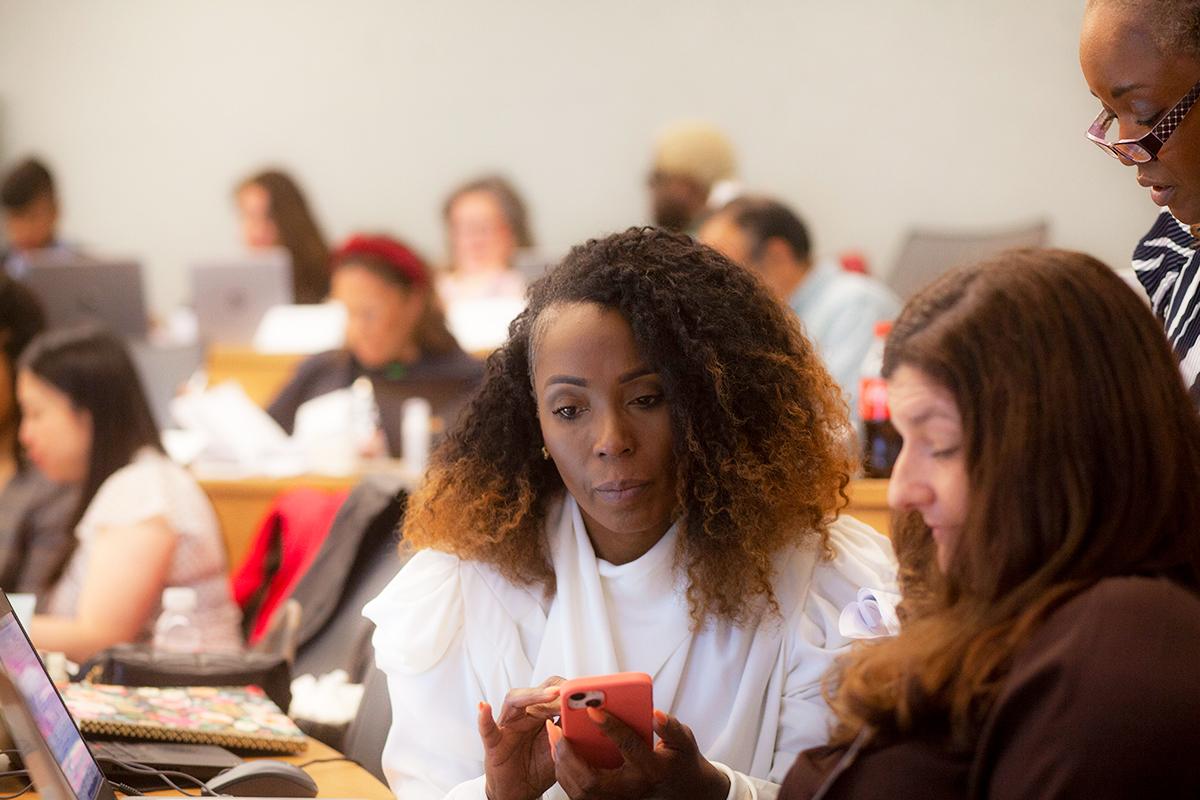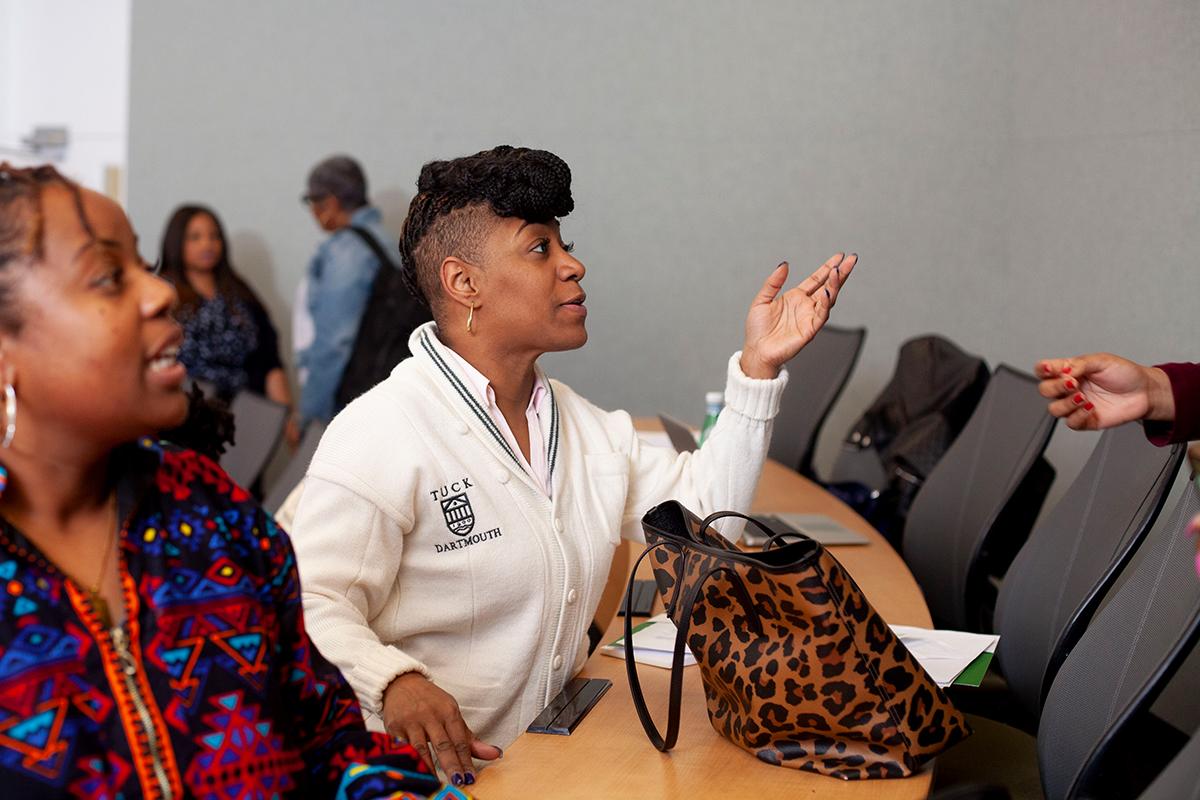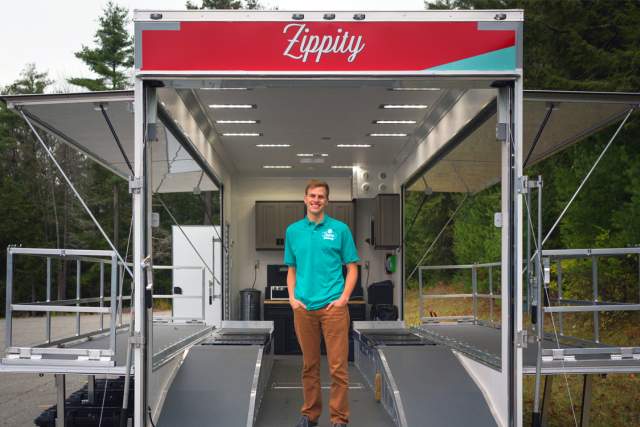For over 40 years, Tuck has been a leader in diversity-focused executive education programs.
Through its two flagship offerings, Building a Successful Diverse Business and Growing an Established Diverse Business, Tuck Diversity Business Programs have helped thousands of underrepresented leaders and entrepreneurs hone their skills and position their enterprises for success.
Though these entrepreneurs turn to Tuck to learn critical business skills to build momentum and reach the next level, they also bring a wealth of experience and knowledge to the table. That’s why, in 2019, Tuck launched a new initiative partnering MBA students with Diversity Business Program participants, called the Diversity Entrepreneurship Collaboration Program.
Run in collaboration with the Tuck Center for Entrepreneurship, the highly selective program matches MBA students and program participants to work on a specific project or problem that the entrepreneur is facing. The project is fully scoped and structured as a consulting project, and participating students receive a half credit for independent study each term they participate. Tuck students bring all they’ve learned through their courses to the team, while participating entrepreneurs contribute their real-world knowledge and experience.
Of course, the project teams are not left without guidance. Each is assigned a pair of faculty advisors who serve as a sounding board and resource throughout the project, meeting weekly with the MBA student to provide additional guidance. The entrepreneur and student partners meet weekly to discuss progress, share feedback, and brainstorm new ideas.
That was one of my favorite parts of the program: working with Barry and meeting after meeting chiseling away at marble, creating a work of art in the end, but not knowing all the details in the beginning or knowing where the journey would lead us.
—Gissell Castellon T’22
In 2021, T’22s Jonathon Chin and Gissell Castellon worked closely with Barry Cole, the founder of Spot Music, a music consultancy and supervision firm with dozens of film and music production credits. Cole sought out help with two projects: a process map for his existing business and a pitch deck for a new venture.
The opportunity to work so closely with an experienced entrepreneur was eye-opening. “Barry is just incredible,” said Chin, a Massachusetts native with a background in merchandising. “He spent so much time teaching us about the music industry and answering our questions. He has so much experience and is so innovative in his thinking that our meetings always ran over without us realizing it.”
But partnering with Cole wasn’t just inspiring. It was also instructive.

Building a Successful Diverse Business is designed for emerging entrepreneurs who are looking to build a strong foundation of business knowledge and learn how to be a better supplier to corporations.
“This work with Barry helped me apply a lot of what I learned in my operations and strategy courses to see where a new product fits, its value proposition, and how to execute the day-to-day. It was a great experience exposing me to an early-stage company where there are a lot of choices that come with difficulties, but also a lot of fun with the different options and opportunities.”
Castellon, who hails from Miami and shares Chin’s merchandising expertise (both students previously worked for Target), concurred.
“From a learning perspective, it was cool to put in place some of the materials we had learned from our core curriculum. Through multiple sessions, we learned how to best tell Barry’s idea,” says Castellon. “That was one of my favorite parts of the program, working with Barry and meeting after meeting chiseling away at marble, creating a work of art in the end, but not knowing all the details in the beginning or knowing where the journey would lead us.”
Castellon also noted that with her background working for a major corporation, working on such a small team was a valuable reminder of the importance of alignment. “I learned that agendas were valuable, debriefs are a must, and clear ownership designations are sometimes needed—even if they seemed obvious.”
Asking clarifying questions and breaking down the vision into short-term and long-term action items are some of my most treasured experiences. The collaboration got me a step closer to helping a startup uncover customer pain points and needs and develop a unique value proposition.
—Shimoli Gandhi T’22
Shimoli Gandhi T’22, who worked with Ayo Jemiri, founder and CEO of LOCOMeX, Inc., an AI-powered collaborative project economy and supply chain procurement platform focused on increasing sustainability and diversity, found that the program was a unique opportunity to work at a different scale. Despite her decade of international experience at Ernst & Young, Gandhi had never worked with an early-stage startup.
“Asking clarifying questions and breaking down the vision into short-term and long-term action items are some of my most treasured experiences,” says Gandhi. “The collaboration got me a step closer to helping a startup uncover customer pain points and needs and develop a unique value proposition.”
For the entrepreneurs in the program, partnering with Tuck students offers a unique chance to gain an outside perspective from talented emerging professionals. Jemiri, a repeat entrepreneur, found that working closely with Gandhi and other students was a win-win.

During Building a Successful Diverse Business, participants work closely with Tuck faculty on key areas that entrepreneurs need to master for success, including strategy, marketing, financial analysis, operations, management, and leadership.
“I knew that partnering with MBA students could only benefit us and give us additional access to Tuck professors,” says Jemiri. “What we were trying to do was really new to the students, so they had a lot to learn too.”
Together, Jemiri and his student team worked to hone his customer acquisition strategy for LOCOMeX by gathering additional insights from his target market.
“We were able to work together to understand the customer’s point of view and adjust our products accordingly. Shimoli and the others helped us do an additional round of customer discovery, created surveys, and helped us collect data and benchmarking information that we’ll use to create a white paper. We’ve been deploying the surveys using our LinkedIn and CRM tools, and we actually found a potentially huge customer using this strategy.”
With rave reviews from both the Tuck students and the business owners, the Tuck Diversity Entrepreneurship Collaboration Program has proven to be a valuable tool for connecting students to professionals with very different backgrounds and experiences. As it heads into its fourth year, the program’s expansion highlights Tuck’s ongoing commitment to the Diversity Business Program—one of many reasons, Jemiri said, that Tuck remains “the gold standard for diverse entrepreneurs.”

